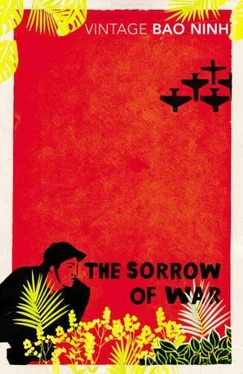Nothing would ever bring her back. He had exhausted his tears on her. He had suffered through the nights when she had openly tormented him, or brought in other lovers. Storming into her room could never have helped things. Drinking until dead drunk to remove traces of her was equally futile. It was over.
In 1965, after three months training, he had been ordered to go south with Battalion 36. There had been ten recruits from Hanoi, so when, they arrived at Hanoi station, on their way through to South Vietnam, the commander gave the ten Hanoi boys a three-hour break to go home and see their families. In those days no special leave passes were issued and progress south was usually made between bombing raids. When President Johnson halted his bombing from time to time the army would seize the opportunity and ship soldiers south.
The commander, who had brought his new troops from Yen The, ordered the ten Hanoi boys to return by 6.30p.m. to catch the troop train. That gave them two and a half hours to visit their families. Any man one minute late back to the station would be considered a deserter, he said. The boys shouted their thanks, and departed.
Kien rushed into the street with his group and hitched a ride on a flatbed truck, whose driver hardly slowed when any of the boys needed to jump off. Going into Kien’s street he showed even less concern for his cargo, forcing Kien to leap clear onto the road from the moving vehicle. He landed heavily and rolled, twisting his ankle. By the time he reached his front gate he was limping, and in pain.
Taking a breath, he held on to the front gate and stared around. His street was deserted. All the houses looked empty and there was no sign of life in his own building. The population appeared to have been evacuated.
Most of the windows of his building had been boarded up. The front yard, where children were usually playing, was deserted, and there was not a soul at the community water tap, which was truly unusual. There were a few old rags hanging on clothes poles, giving the entire place an even more forlorn look.
Few families had remained in Hanoi. Most buildings had been locked. Notes were left pinned on doors, others written in chalk out front. These public messages, from wives to husbands, mothers to children, served as public notice-boards. But there were no lines, no notes from Phuong for him. Nor had he received a letter from her while he’d been in training camp. The front door was unlocked, so he quietly stepped in and began climbing the stairs to his apartment on the third floor. He stood outside the blue door, looking at the huge, brass padlock. Of course! Phuong had his key, on a string around her neck. She wore it like a necklace. He looked around for a pen and paper, or chalk, to write a line for her, but saw none, so turned and began trudging downstairs.
‘Hello, fighter,’ said a man’s voice, startling Kien. It was Huan, Sinh’s brother, a worker at the Yen Phu power station. Kien, pressed for time, apologised to Huan for not coming to his apartment, asking where everyone was. His school friend Sinh had been admitted to university, said Huan. Everyone else had been evacuated, he said, but they were all safe.
‘I wonder if they’ll bomb Hanoi,’ Huan asked. But Kien did not respond, realising then that he had come only to see Phuong and that no one else mattered. He turned and waved goodbye in the same movement, not even telling Huan he was off to the front. Huan ran after him. ‘Kien, I forgot. Did you want to find Phuong? I know you’re close to her.’
‘Yes. Where is she?’
‘Her mother died. Word came to the university and she had to drop everything and go. I think she’s at the station. I saw her heading that way with her school satchel. She’s upset.’
‘Are you sure it’s the station?’ asked Kien, grabbing him.
‘All she said was, “Look after the apartment. I’ve got to go.” That’s all I know.’
Kien made his way to the station on foot, ignoring the pain in his ankle. The platforms were crowded, with soldiers and civilians intermingling. People rushed helter-skelter, brushing past with luggage, climbing on trains that were departing in quick succession. Hundreds of people could be seen in each carriage, and on roofs, on steps, blocking all possible entrances, forcing new arrivals to climb in through windows. It seemed hopeless.
Panic began to set in. Kien pushed angrily through the crowds, asking himself: Which line? The train to Highway 5? North to Lao Cai? Which damned compartment, in which carriage, on which train?
He struggled from platform to platform for another ten minutes before stopping, exhausted, letting himself be buffeted around as he rested.
He had found himself standing on Platform 1, near the Thai Nguyen train, which was about to leave. The university was evacuating students and studies would continue in a rural area. The long train looked like a multi-sectioned python covered with aggressive forest ants.
From the last compartment to the final carriage there appeared the face of a handsome young man who seemed to be looking at Kien. No, he was looking past him and shouting: ‘Come on! What are you waiting for? No one can get seats.’
The young man continued looking in Kien’s direction, adding: ‘What the hell are you staring at, Phuong? Get a move on!’ he shouted angrily.
A sudden pain stabbed at Kien. He looked slowly to his right, and there she was. ‘Phuong!’
Suddenly she seemed to be the only person on the platform. She was standing perfectly still, staring at him with her lovely big eyes wide open in surprise. Her long hair flowed over her forehead and cheek and twined in the shoulder strap of her satchel. Suddenly the young man reached out and pulled at her arm. ‘Are you crazy? Get in!’
She shook him free and stepped out of his reach. The train began moving off, bearing him with it. He was still shouting angrily as the train took him away.
When the train had gone Phuong seemed to snap out of her reverie and broke into a big smile. ‘What incredible luck!’ she shouted, taking his hand and moving away from the lines. ‘Let’s go. We were lucky to catch each other.’
The small disquiet that arose as he saw the young man staring fiercely at him as the train pulled away stopped Kien for a moment. But the importance of the occasion was too great, and he damped down the feeling and was soon immersed into the wondrous company of his beautiful Phuong. She was speaking to him as they pushed their way through the crowd, but he could hardly hear a word. He took her school satchel and held her hand, leading her outside.
‘Let’s go back home,’ she said, ‘have dinner together, then go for a walk. You look terrific in that uniform.’ She babbled on happily. ‘Don’t think they’ll cut the power tonight. Most people are away. What’s wrong with you?’ she asked in the same breath, suddenly noticing his anxiety.
‘I’m going to the front,’ he said quickly, getting the bad news out. As he said it he realised that for the first time he was experiencing a little of what was to come in being apart from Phuong. He grew hoarse, more words would not come. It meant being hundreds of miles away down south; he would be completely powerless to return to her.
She stood still, taking it all in. ‘Can’t be helped,’ she said quietly. ‘Look, we can go home and get back here by 6.30. We’ll burn a joss stick and say a prayer for your dad and my mum. Let’s get a cyclo, we’ll make it.’
Phuong called a cyclo and quickly bargained. ‘Twenty minutes,’ she told the rider. ‘Do it faster and I’ll pay extra.’
But when they reached their street and were about to enter the building the air-raid siren sounded. The driver, who was going to wait, panicked and ran off, without being paid, in search of a bomb shelter. It was getting dark quickly and they felt the seconds ticking by. Yet every moment was to be treasured.
Читать дальше












